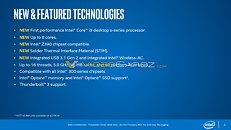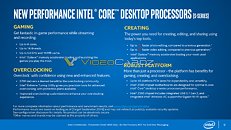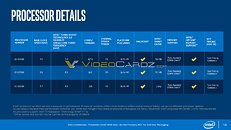Friday, August 17th 2018

Intel Confirms Soldered IHS for 9th Gen Core Series
Soldered integrated heatspreader has been a longstanding demand of PC enthusiasts for Intel's premium "K" mainstream-desktop processors. With AMD implementing it across all its "Summit Ridge" and "Pinnacle Ridge" Ryzen AM4 processors, just enough pressure for built on Intel. The company, in a leaked slide, confirmed the feature-set of its upcoming 9th generation "K" Core processors, which highlights "STIM" (soldered thermal interface material) for this chip. It shows that STIM could be exclusive to the "K" series SKUs, namely the i9-9900K, i7-9700K, and i5-9600K.
The slides also list out the clock speeds and cache sizes of the three first 9th generation desktop SKUs, confirming that the Core i7-9700K will indeed be the first Core i7 desktop SKU ever to lack HyperThreading. The TDP of the 8-core chips don't seem to breach the 95W TDP barrier Intel seems to have set for its MSDT processors. The slides also seem to confirm that the upcoming Z390 Express chipset doesn't bring any new features, besides having stronger CPU VRM specifications than the Z370. Intel seems to recommend the Z390 to make the most out of its 8-core chips.
Source:
VideoCardz
The slides also list out the clock speeds and cache sizes of the three first 9th generation desktop SKUs, confirming that the Core i7-9700K will indeed be the first Core i7 desktop SKU ever to lack HyperThreading. The TDP of the 8-core chips don't seem to breach the 95W TDP barrier Intel seems to have set for its MSDT processors. The slides also seem to confirm that the upcoming Z390 Express chipset doesn't bring any new features, besides having stronger CPU VRM specifications than the Z370. Intel seems to recommend the Z390 to make the most out of its 8-core chips.



93 Comments on Intel Confirms Soldered IHS for 9th Gen Core Series
I mean, yeah the goal is to do money thanks to capitalism, but can't they respect us a bit at least and not take us for plain morons?
But sure, if AMD wasn't so busy ruining itself, Intel might have given us those 6 cores a year earlier or something.???
It's a second generation using the same platform, so pretty much what Intel has been doing for a while.
Next gen will use a different socket.This I didn't expect. I actually believe it's a reaction to users' expectations more than an actual engineering necessity.
Of course most clients don't care what's under the heatsink, but at least all the internet/review TIM criticism will be gone.So now what? You'll become an Intel fanboy now or are we doomed to years of "thank you AMD"? :)
btw I wonder what's next, 10900K ? Y2K ?
@RejZoR please school us on this one ;):laugh:
Thank you AMD :love: Now ditch SMT and release a CPU with 8 core CCX on 7nm.
AMD's "threat" is closing in and Intel, in an effort to remain in the lead for a longer period while they come up with a proper reply to Ryzen's performance AND scalability, are pulling "all the stops". This move will guarantee their continued lead in single threaded performance (which is already significant) and hope to stay that way by the time Zen 2 products are launched.
For those that wish to discuss the recent security flaws, there's a topic for that already in the news section: suggest we use it when discussing that specific issue.
You got some controlling vibes coming off you. Swear you tried to tell me what to do.
Why just roll over and not ask for it? Why not just roll over on non-soldered chips too? You can have goo paste ones since you don't really mind and are drowning in so much cash that you just buy em by the lot from silicon lottery who will fix them for you. Since you're so rich and all, bet my johnson is bigger, after you lose maybe I could finally afford HEDT.
(disclaimer - this post was sarcastic, I do not advocate that TPU be turned into a showcase for photo-shopped genitalia!)
it's hit or miss, according to the results I posted
+14%
+0,8%
-1,9%
+2,3%
-1,5%
-1,7%
+6,5%
+23%
+16%
+11%
it had helped to gain 10-15% in 3 cases out of 10, in just as many performance was lost,though only marginally. You could see over 20% in only one, 3 out of 10 had either minimal or very small gains.
It does on AMD what it does on Intel,meaning it only helps in very specific conditions. Ideally you'd rather have more physical cores than SMT. It may seem SMT is better but that's just cause it helps Ryzen more as this chip is more multi thread oriented with lower single core performance and higher latency. Intel has better single core performance,therefore you achieve slightly lower CPU load on physical cores,which in turn translates to HT making less difference on Intel cpus than SMT does to AMD ones.
Do you even slightly understand how CPUs are produced and positioned? :)Every CPU will transfer heat faster after delidding. You mean replacing the conductor, right?
How can they have better stock speeds after that? Stock speeds are fixed.
We've seen overclocked 7700K pulling 150W and working perfectly well with the factory TIM.
There's enough headroom for 6 and 8-core CPUs (without OC, obviously).When will people learn that the "scalability" is simply a cost lowering idea. It hurts the performance.
We all should be hoping that Intel can keep designing CPUs how they used to (and selling it at higher prices).
They could have a version of the 8600K soldered and with a slight base clock jump and make a "new chip" out of it ...
... Oh wait ...
That's what the I5-9600K is ...
i7 = 6/12
i9 = 8/16 would have been better
i3 = 2c4t
i4 = 4c4t
i5 = 4c8t
i6 = 6c6t
i7 = 6c12t
i8 = 8c8t
i9 = 8c16t
i10 = 10c10t
...and so on in the same progression, right through the HEDT lineup
All unlocked, all soldered
The even-numbered CPUs all designate actual core/thread count, the odd-numbered CPUs are all hyper-threaded - once you know these 2 simple facts, you can figure out where any CPU belongs in the heirarchy.
It's clean, decisive, ends any confusion, and all possible permutations are covered - meaning Intel will never go for it!